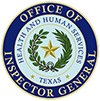Data analytics informs future OIG COVID-related work
COVID-19’s taxing impact on the health care industry has the potential to create opportunities for errors in and exploitation of the Texas Medicaid system. With a mission to prevent, detect and deter fraud, waste and abuse (FWA), the OIG’s response to the pandemic has focused on how to assess program integrity within the evolving crisis. The OIG does this by maximizing existing resources and expertise while collaborating with other health care and fraud prevention professionals.
Data identifies trends
The OIG’s Policy and Strategic Initiatives team and Fraud, Waste and Abuse Research and Analytics team are working together to identify emerging trends and potential FWA schemes in health care related to COVID-19. They are reviewing published reports and identifying focal points for data analysis related to program integrity. OIG staff are currently using data analytics to:
- Monitor the use of COVID-related procedure codes and modifiers,
- Monitor previously established concerning behavior and any changes in occurrence during the COVID time period (e.g., the delivery of prohibited non-essential/elective services during Texas’ initial “shelter in place”),
- Analyze potential program impacts related to the shift from face-to-face health care to telehealth visits.
Data analysis, ongoing OIG investigations and nationwide collaborations have revealed a variety of COVID-related issues that may warrant additional review. These are potential topics for further OIG work:
COVID time period billing
Managed care organizations (MCOs), the OIG, federal contractors and state Medicaid programs areas are seeing COVID-19 “spike-billing” (an increase in billing during the lockdown period), back-billing (billing after a lockdown but with dates of service during the lockdown) and unsuspected billing where the patterns neither changed or increased in response to the pandemic. The OIG is running data reviews to search for such billings.
Telehealth services
With the onset of COVID, the Centers for Medicare and Medicaid Services increased the number of Medicaid services available by telehealth and indicated these temporary flexibilities may become permanent. Easing restrictions on the use of telehealth technology potentially presents bad actors in the telehealth space with opportunities to engage in schemes that were not possible one year ago.
PCR testing
One of the ways COVID-19 is identified is through a polymerase chain reaction (PCR) test. In addition to identifying COVID, PCR panels can detect several respiratory and gastrointestinal pathogens. While using a PCR panel to test for multiple possible conditions or pathogens, the expanded use of this test may not always be medically necessary. The OIG has identified instances where providers have ordered a PCR panel test for conditions or pathogens beyond COVID-19 when not medically necessary, based on medical records review.
CLIA certification
Clinical Laboratory Improvement Amendments of 1988 (CLIA) certifications are required to perform different lab tests. CLIA certification is important because it verifies that laboratories meet federal performance, quality and safety standards to properly diagnose, prevent and treat diseases.
The OIG has previously identified labs that did not have the proper CLIA certification for the tests being performed and may review this issue for PCR testing.
Additional monitoring activities
The OIG is monitoring national COVID-19 related fraud schemes through a variety of federal sources:
- National Health Care Anti-Fraud Association
- National Association of Medicaid Program Integrity
- Healthcare Fraud Prevention Partnership
- Federal OIG
- Centers for Medicare and Medicaid Services (CMS).
The OIG also participates in the CMS Program Integrity FWA Technical Assistance Group calls to monitor other states’ identified fraud schemes. Additional trends are identified by working with Medicaid and CHIP Services and the Center for Analytics and Decision Support.
MCO collaboration
The OIG continues to partner with MCOs and their Special Investigative Units to share information related to potential COVID-19 related FWA trends or schemes. Early on, one MCO shared a concern related to flexibilities with telehealth policies and therapies which allowed the OIG and Medicaid and CHIP Services to address policy gaps. During a series of one-on-one meetings with the OIG, some MCOs have shared information regarding their monitoring efforts for COVID-19 related FWA issues; they have pledged to send any concerning trends or cases through the OIG referral process.
The OIG has adjusted to the changing environment throughout the pandemic and worked with providers at every step. The OIG remains committed to collaborating with providers to identify COVID-19 related schemes and prevent FWA from happening in the first place. The OIG will continue to adapt to events, anticipate their results and take action to support health care delivery in Texas.

